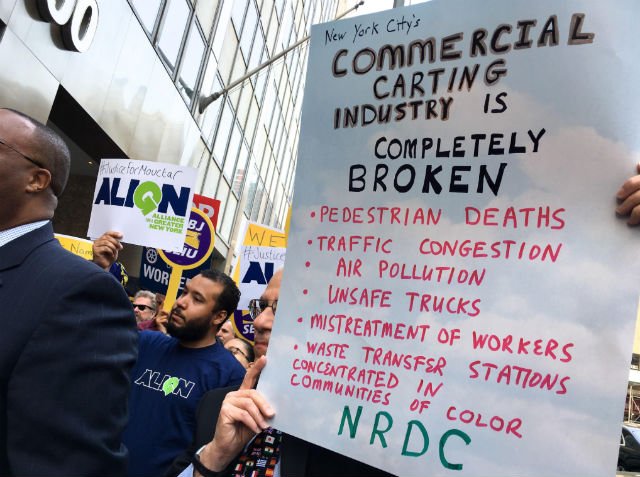City Council Bill Goes Further To Rein In 'Bad Parts' Of Private Carting Industry
May 29, 2019, 12:11 p.m.
The new bill divides the city into 20 commercial waste zones that are each served by one designated private carting company.

Protesters at a rally last year urging the city to revoke Sanitation Salvage's license. Their license was later suspended, and eventually the company surrendered it.
A new City Council proposal would dramatically reshape the city’s private trash collection industry in an effort to cut down on truck emissions and improve working conditions for employees.
Under the new bill, which is set to be introduced on Wednesday, the city would be divided into 20 commercial waste zones that are each served by one designated private carting company. Currently, there are no specific zones for the more than 90 private carters that collect trash from over 100,000 city businesses, leading to dangerously long routes, overworked employees and heavy pollution.
“There’s so many bad parts of this industry that need to be fixed,” Brooklyn Councilmember Antonio Reynoso, the bill’s main sponsor, told Gothamist/WNYC. “And this is one part of the many layers that we’re trying to address.”
The bill, which is co-sponsored by Speaker Corey Johnson, goes further than the long-promised reforms proposed by the city’s Sanitation Department last November. Under that plan, the city would be split into twenty zones that are served by three to five commercial carters. Each zone would have between 3,300 and 9,800 customers. The department has said that a nonexclusive zoning plan would maintain competition among private carting companies while decreasing truck traffic and inefficient routes.
Reynoso says that exclusive zones could decrease carting traffic by up to 70 percent, down from the current number of 79,000 vehicle miles traveled per day. Having one carter per zone would also help stabilize prices for businesses, according to Reynoso’s office, creating more predictable and reliable service.
Listen to Mara Silvers' report on WNYC:
Both types of zoned systems have been highly contentious among representatives of the carting industry and businesses that support the current open-market concept.
“Either type of zone system would eliminate dozens of locally-owned and operated companies, as well as good-paying jobs while driving up prices to customers and reducing incentives for good service,” said Kendall Christiansen, the executive director of New Yorkers for Responsible Waste Management, a group that lobbies on behalf of private carters.
Reynoso’s office acknowledges that an exclusive zoning system would lead to the closure of some private companies, but said it did not expect to see an overall decrease in jobs, noting that the same amount of trash will need to be collected every day.
The idea of having one carter per zone has also received pushback from DSNY. In a statement, department spokeswoman Dina Montes said that the city’s plan of having three to five carters for each zone prevents a situation in which a zone is “vulnerable” to a single carting company that might not fulfill its duties.
“A non-exclusive system achieves very similar efficiency and emissions improvements compared to an exclusive system, while avoiding the large disruption to the market and customers that would come with having only one carter per zone,” said Montes.
Alternatively, Reynoso says that having one carter per zone will help the city be highly selective in selecting companies in the first place, following an intensive RFP process.
“The Sanitation Salvages of the world [are] doing everything the wrong way,” said Reynoso, referring to the private carter that surrendered its license last year following the death of one of its workers and a pedestrian within a six month time period. “There’s no way that a company like Sanitation Salvage wins an RFP in this process.”
Private carters could still have their licenses suspended or revoked for multiple infractions, said Reynoso, in which case the Department of Sanitation would temporarily take over the trash collection for a specific zone.
According to the bill language, contracts to carters will be based on many criteria, including the company’s history of complaints from businesses, plan to reduce air pollution and greenhouse gas emissions, rates for service, and past compliance with local, state, and federal labor and safety laws.
If awarded, a private carter’s contract with the city would last for ten years with the option to extend for two additional five-year terms. Companies would not be allowed to serve more than 15 commercial waste zones, and could subcontract with other private haulers if they are not equipped to serve an entire zone, which Reynoso said could also keep smaller carting companies in business.
“We’re not looking to get a Mom and Pop business that has five trucks, that is doing this work for a long time the right way — we want them to keep doing business in the city,” said Reynoso.
Such a drastic overhaul of the system would take years to put into place. Reynoso’s office estimates that, if passed, the zoned system would not be implemented until the end of 2023 or the beginning of 2024.
And first, the bill has to clear the council. Despite having support from a number of members and other labor and environmental groups, including Teamsters Local 813 and Transform Don’t Trash NYC Coalition, Reynoso accepts that the legislation will likely undergo many changes before coming up for a vote.
“We have a lot more work to do. It’s a rough draft,” said Reynoso. “But at the core of what we’re trying to do is radically change the way we do business in this, what I consider, overlooked and under regulated industry in the city of New York.”
Mara Silvers is an assistant producer at WNYC. You can follow her on Twitter at @mara_silvers.